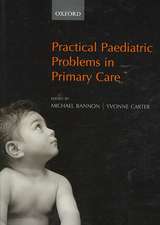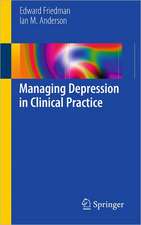From General Practice to Primary Care: The industrialization of family medicine
Autor Steve Iliffeen Limba Engleză Paperback – 14 feb 2008
Preț: 344.62 lei
Preț vechi: 449.41 lei
-23% Nou
Puncte Express: 517
Preț estimativ în valută:
65.95€ • 68.44$ • 55.12£
65.95€ • 68.44$ • 55.12£
Carte tipărită la comandă
Livrare economică 04-10 martie
Preluare comenzi: 021 569.72.76
Specificații
ISBN-13: 9780199214501
ISBN-10: 0199214506
Pagini: 248
Ilustrații: 5 line illustrations
Dimensiuni: 137 x 215 x 14 mm
Greutate: 0.33 kg
Ediția:7
Editura: OUP OXFORD
Colecția OUP Oxford
Locul publicării:Oxford, United Kingdom
ISBN-10: 0199214506
Pagini: 248
Ilustrații: 5 line illustrations
Dimensiuni: 137 x 215 x 14 mm
Greutate: 0.33 kg
Ediția:7
Editura: OUP OXFORD
Colecția OUP Oxford
Locul publicării:Oxford, United Kingdom
Recenzii
An excellent interpretation of where we have come from, where we might end up...and what we can do to achieve a degree of self determination in the face of recent reforms.
Interesting, topical, and clear. The arguments are presented logically and in balanced way. An important - original - book.
Dr Iliffe convincingly describes the process of industrialisation of family medicine through a highly researched book littered with interesting quotes and references. I recommend this book to both new and experienced members of primary care who wish to understand more about this process of industrialisation and how we can best optimise the changes that it brings.
Professor Illife has presented a view of what is happening to general practice that is both immensely simple and profoundly complex. The changes that have afflicted general practice in the UK in the last 20 years are all part of a single process: industrialisation...he pursues his case in compelling historical and theoretical detail...this makes the book a challenging read...a thorough, impressive, and persuasive book.
Interesting, topical, and clear. The arguments are presented logically and in balanced way. An important - original - book.
Dr Iliffe convincingly describes the process of industrialisation of family medicine through a highly researched book littered with interesting quotes and references. I recommend this book to both new and experienced members of primary care who wish to understand more about this process of industrialisation and how we can best optimise the changes that it brings.
Professor Illife has presented a view of what is happening to general practice that is both immensely simple and profoundly complex. The changes that have afflicted general practice in the UK in the last 20 years are all part of a single process: industrialisation...he pursues his case in compelling historical and theoretical detail...this makes the book a challenging read...a thorough, impressive, and persuasive book.
Notă biografică
From 1978 to 2007 Steve Iliffe worked in an inner-city general practice, helping build a large multi-disciplinary team of doctors, nurses, psychologists and counsellors that achieved Beacon status for patient services. He leads a research team that works on service development and evaluation, innovative approaches to professional education and the provision of services. His research interests are in health promotion in later life, the recognition of and response to dementia syndromes, hospital at home services, and exercise as therapy for older people, and he is on the editorial board for numerous journals on these subjects. He is an Associate Director of the national co-ordinating centre for Dementias and Neurodegenerative Diseases networks (DeNDRoN) with a responsibility for primary care and patient and public involvement, and was a member of the NICE/SCIE dementia guidelines development group. In 2006 he won the inaugural William Farr medal for contribution to health care for older people.












